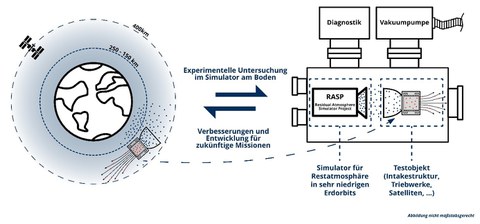Feb 07, 2025
Wind tunnel for space: TU Dresden scientists develop unique atmospheric simulator

Principle sketch of the experimental setup
Researchers at the Chair of Space Systems at TUD Dresden University of Technology (TUD) are developing a kind of wind tunnel for space. It simulates the atmosphere in very low Earth orbit in order to test a new generation of satellites that use ambient air as fuel for their propulsion system. The RASP ("Residual Atmosphere Simulator") research project is funded by the European Space Agency (ESA) as part of the ARTES program.
Satellites with conventional engines cannot operate continuously at an altitude of 100 to 250 kilometers, as the residual atmosphere there generates a lot of friction. They would consume large quantities of fuel in a short space of time to compensate for this resistance. In order to test novel "air-breathing" propulsion systems for satellites under realistic conditions, the research group at the TUD simulates the atmosphere in very low Earth orbit in a special vacuum chamber. They generate particle streams at a speed of 8 kilometers per second, consisting of oxygen and nitrogen molecules - just like in real orbit.
"Thanks to this innovative form of propulsion, the new satellites could theoretically be used indefinitely. In addition, the low orbital altitude offers further decisive advantages: The shorter distance to Earth enables more efficient communication due to reduced signal delays. Earth observation satellites can record images in higher resolution. Space debris is also reduced, as at these low altitudes debris is quickly slowed down and burns up in the atmosphere," explains Prof. Martin Tajmar, Chair of Space Systems.
Until now, the space sector has lacked suitable test rigs that could realistically simulate the conditions in low-Earth orbit. The 2.5-year RASP project closes this gap and makes a decisive contribution to the further development of sustainable and efficient satellite propulsion systems.
Contact:
Prof. Martin Tajmar
TU Dresden
Chair of Space Systems
Institute of Aerospace Engineering
Phone: 0351 463-38091
E-mail:
